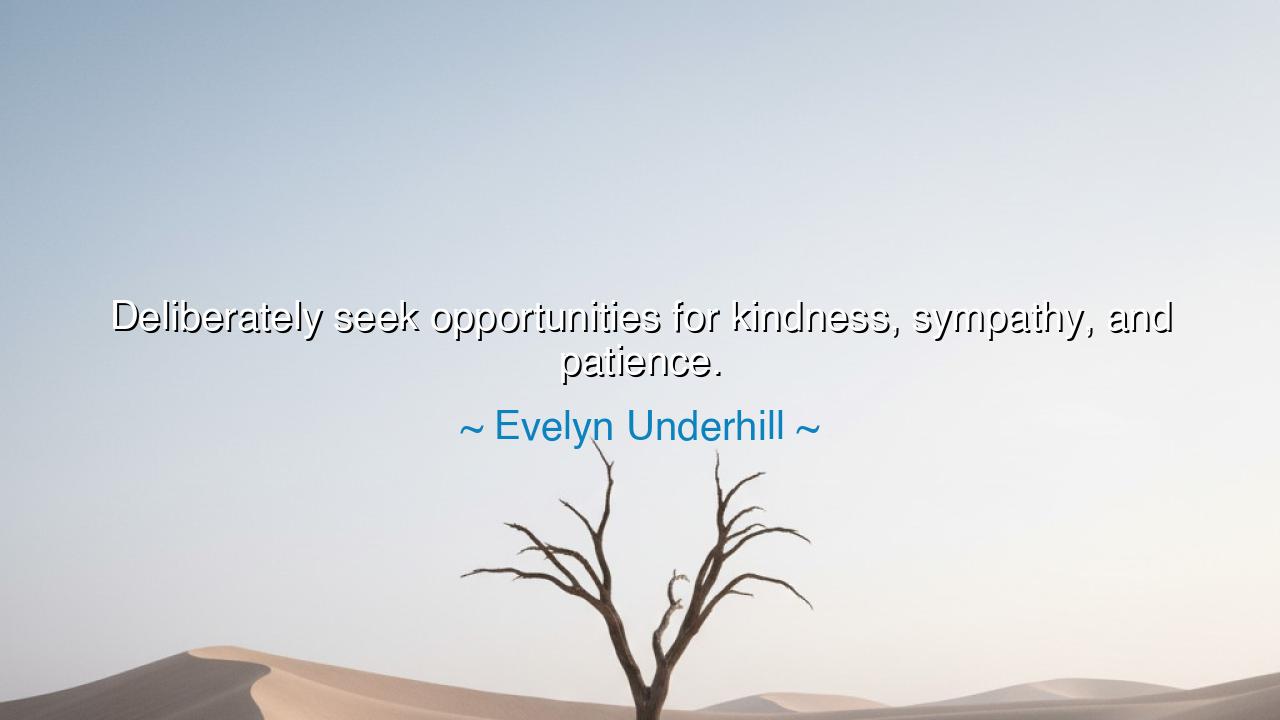
Deliberately seek opportunities for kindness, sympathy, and






Hear now, O children of the future, the wise words of Evelyn Underhill: "Deliberately seek opportunities for kindness, sympathy, and patience." These words speak to the essence of human interaction, reminding us that the path to a meaningful life is not found in grand achievements or momentary glory, but in the small acts of grace that we offer one another. Kindness, sympathy, and patience are not mere reactions to the world; they are choices—intentional acts that require us to look beyond our own needs and engage with others in ways that uplift, heal, and connect. Underhill teaches us that these virtues are not gifts that fall upon us by chance, but rather intentional pursuits that we must actively seek.
In the ancient world, O children, heroes were often defined not just by their physical strength, but by the virtue of their character. The Greek philosophers, like Aristotle, believed that virtue was something to be cultivated over time, not something given at birth. A person could be born with strength or wisdom, but it was only through conscious practice and discipline that they could develop the deeper qualities of kindness, sympathy, and patience. Consider the great hero Odysseus, who, after long years of battle and suffering, was shown mercy by the gods not just because of his bravery, but because of his humility and his understanding of the struggles of others. Odysseus’ journey was not just one of physical distance but of emotional growth, as he learned the importance of being kind to those who helped him, sympathetic to those who suffered, and patient with the uncertainties of his journey.
Think of the story of King Solomon, whose wisdom was legendary. When two women came before him, each claiming to be the mother of the same child, Solomon did not immediately make a judgment based on evidence or his own power. Instead, he sought the most patient and compassionate solution—by offering to cut the child in half, he revealed the true mother through her selflessness and sympathy for the child’s fate. Solomon’s act was not just one of judicial cleverness but of profound kindness and patience in understanding the deeper motivations of the women. His wisdom was rooted not in an instant solution, but in the time and space given for empathy and understanding to emerge. The story teaches us that the path to justice and truth is paved with deliberate care and consideration for others.
Evelyn Underhill’s words call us to recognize that the greatness of life does not lie in the sweeping gestures of power, but in the deliberate pursuit of these virtues. Kindness, sympathy, and patience are not passive qualities that we wait for to appear in our lives. They are actions that must be sought out in each moment, and actively cultivated in our interactions with others. These virtues require us to be present, to understand the struggles of others, and to offer not just what is easy, but what is needed. Like a gardener tending to their plants, we must carefully nurture these qualities, giving them the time and attention they need to grow strong.
Consider the life of Mother Teresa, who dedicated her life to serving the poorest and most forgotten members of society. She did not simply offer charity, but kindness, sympathy, and patience—the very qualities that Underhill speaks of. Mother Teresa understood that true service is not just about giving material things, but about offering one’s heart to others. Her acts were not based on grand displays of heroism, but on the quiet, patient love that she extended to the people she cared for. She did not wait for opportunities to be kind, she sought them out—knowing that every moment was an opportunity to offer comfort, hope, and compassion to those in need. Her legacy reminds us that the greatest acts are not always the most visible or celebrated, but are often the most humble and deliberate.
The lesson here, O children, is that kindness, sympathy, and patience are not traits that we can afford to take for granted. They are qualities that we must actively seek, practice, and embody in our daily lives. To be kind is to make the choice to see the world with open eyes, to understand the pain and struggles of others, and to offer whatever comfort or assistance we can. Sympathy is not about feeling sorry for others from a distance, but about truly understanding their suffering and offering help where we can. Patience is the quiet strength to endure difficulties, both our own and those of others, without rushing to judgment or despair. When we deliberately seek these virtues, we are not just improving ourselves; we are building a world where compassion reigns, and where true connection is possible.
In your own lives, O children, remember that every moment is an opportunity to seek kindness and practice patience. In your family, in your school, in your work, look for the moments where a simple act of kindness can make a profound difference. Show sympathy to those around you, especially those who are struggling, and be patient with those who may not yet understand the challenges you face. The world will change not through grand speeches or actions, but through the small, deliberate choices we make to treat one another with love and care. Kindness, sympathy, and patience are the threads that bind humanity together, and it is through them that we find the true meaning of a life well-lived.






AAdministratorAdministrator
Welcome, honored guests. Please leave a comment, we will respond soon